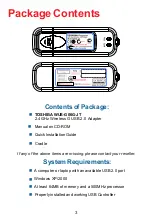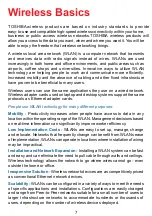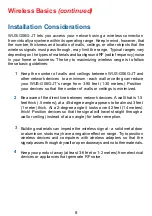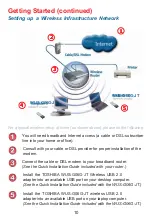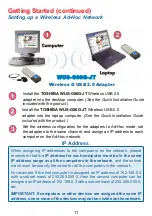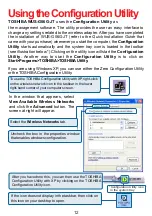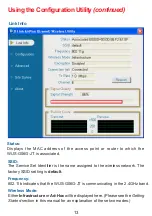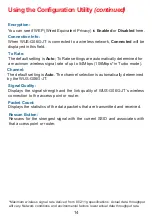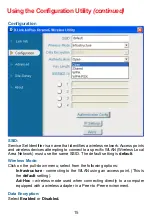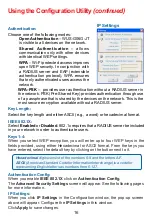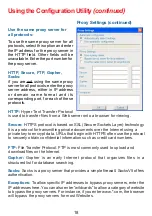
4
Introduction
The
TOSHIBA WUS-G06G-JT
W
ireless
USB
Adapter
is
an
802.11b/802.11g high-performance,convenient Plug & Play USB 2.0 solution that
brings wireless networking to your laptop or desktop PC.
With a maximum wireless signal rate of up to 54Mbps (108Mbps* in Turbo
mode) you can connect to a wireless network at home, at the office or at any
wireless hotspot. Now you can stay connected wherever you are and wherever
you go.
WUS-G06G-JT
is Wi-Fi compliant, meaning that it can connect and interoperate
with other 802.11b or 802.11g Wi-Fi-compliant wireless routers, access points
and adapters.
WUS-G06G-JT
connects to any available USB port on a laptop
or desktop Windows -based computer and also includes a USB cradle. With
the optional USB cradle,
WUS-G06G-JT
can be positioned virtually anywhere
at a workstation to achieve the best available wireless signal reception - whether
that workstation is in your office, on your deck or patio, by the pool, at the local
coffee shop, or in an airport terminal while waiting to board your next flight.
The adapter works with Microsoft Windows XP and Windows 2000 operating
systems to ensure that you’ll be up and running on a wireless network in just a
matter of seconds.
Using its default settings, the
WUS-G06G-JT
automatically connects to other
TOSHIBA
wireless products as soon as it’s active.
*Maximum wireless signal rate derived from IEEE Standard 802.11g specifications. Actual data
throughput will vary. Network conditions and evironmental factors lower actual data throughput rate.
WUS-G06G-JT
has the newest, strongest and most advanced security features
available today. When used with other 802.11 WPA (Wi-Fi Protected Access)
and 802.1x compatible products in a network with a RADIUS server, the security
features include:
WPA: Wi-Fi Protected Access which authorizes and identifies users based
on a secret key that changes automatically at regular intervals. WPA
uses TKIP (Temporal Key Integrity Protocol) to change the temporal
key every 10,000 packets (a packet is a kind of message transmitted
over a network.) This ensures much greater security than the standard
WEP security. (By contrast, the previous WEP encryption
implementations required the keys to be changed manually.)



